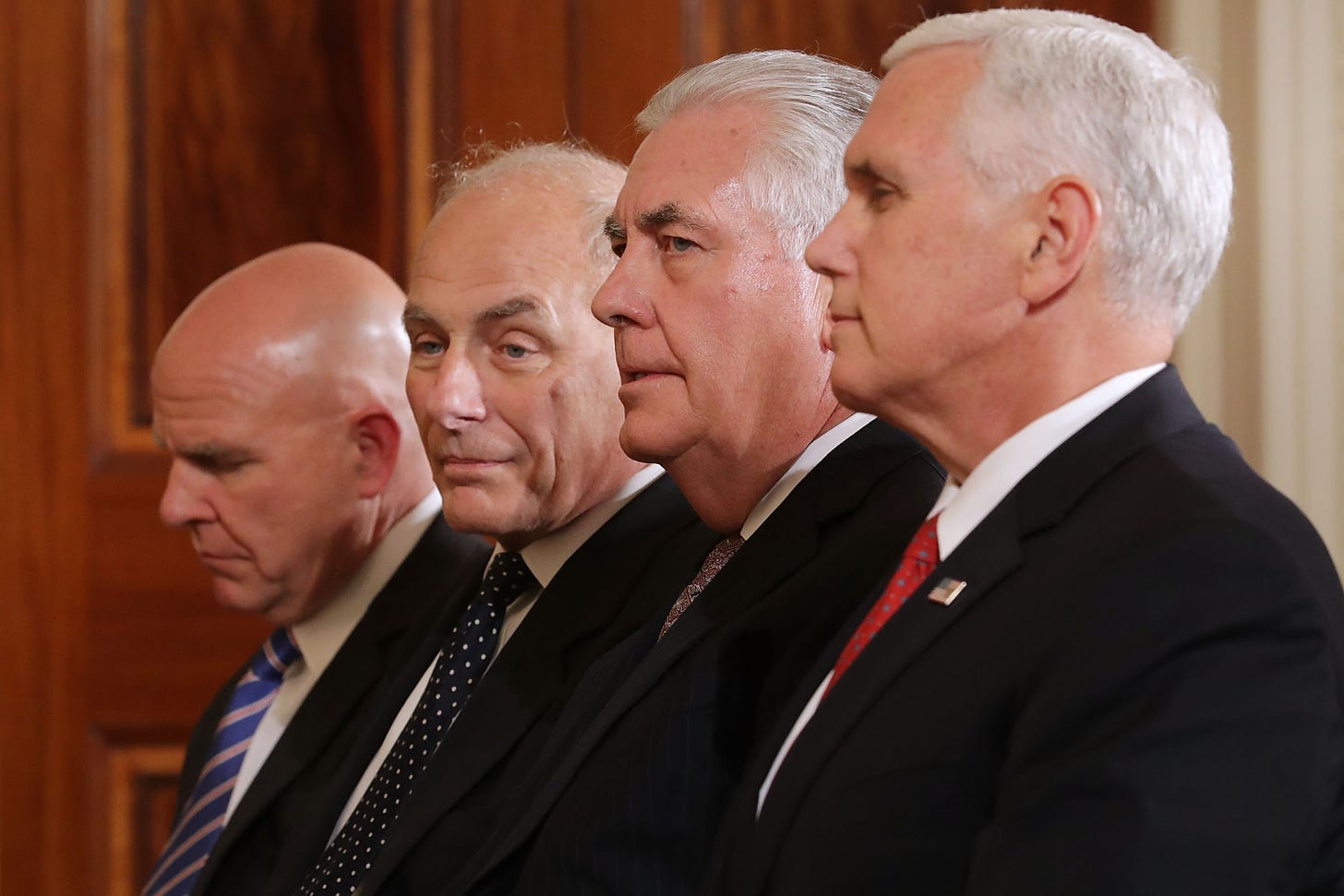Why Are “Former Administration Officials” Still Not Speaking Up About Trump?
It’s happening again. And they’re quiet again.

FROM CNN’S CALAMITOUS TOWN HALL to the ABC News/Washington Post poll showing Donald Trump leading President Joe Biden by 6 points, the prospect of Trump returning to the White House can no longer be dismissed even by those who most wish to dismiss it.
Neither can it be dismissed what a Trump restoration would mean. Trump is not hiding the threat he poses to the nation—he’s flaunting it. Trump plotted a coup to try and steal the 2020 election and hold power through the incitement of an insurrection.
And he’s campaigning on this history.
Trump made clear he will not accept the outcome of next year’s election, either, unless he is the winner. He is promising pardons for the insurrectionists who attacked the Capitol. He called January 6th “a beautiful day,” called the police officer who fatally shot rioter Ashli Babbitt “a thug,” urged members of Congress to default on the debt, admitted to trying to overturn Georgia’s 2020 popular vote in his call with Georgia Secretary of State Brad Raffensperger by stating “I said ‘you owe me votes because the election was rigged,’” declared former Vice President Mike Pence “made a mistake” in not overturning the election for him, and did not deny (“not really”) showing anyone the classified documents he stole from the White House that he still insists belong to him.
He called in to a QAnon rally and let Michael Flynn know he would hire him again in his next administration.
And all of that is just from the last two weeks.
Everyone on the outside can see this. But there is a group of citizens who know even more keenly how dangerous another Trump term would be: the people who worked for him the first time.
Is it too much to ask that “former administration officials” speak honesty about the danger Trump poses now?
Because it seems that it would be helpful, and important, to hear the truth—ideally in a united, coordinated way—from the following people:
Gen. John Kelly
Gen. Mark Milley
Dan Coats
Rex Tillerson
Gen. James Mattis
Lt. Gen. H.R. McMaster
Reince Priebus
Steve Mnuchin
Gina Haspel
Gary Cohn
Kirstjen Nielsen
That’s a partial list of the most high-profile adults in the room who worked for Trump the first time and clearly understand who and what the man is. There are others from the middle and lower ranks of government who could—and should—join them.
What’s important about this list is that none of these figures has anything to lose. Mike Pence won’t speak honestly about how dangerous Trump is because he thinks he’s running for president. And Mike Pompeo, despite having declined to run for president, is still nursing his own ambitions and so cannot be counted on to do the right thing. No one needs to hear from Bill Barr, who went on a book tour to describe how Trump became “manic and unreasonable and was off the rails” before January 6th and said that “the absurd lengths to which he took his ‘stolen election’ claim led to the rioting on Capitol Hill.” Barr also said he will vote for Trump should he win the nomination.
But the rest of these figures have no such constraints. Jim Mattis is off living his best life—getting married to a physicist he met in a bar at a Vegas ceremony. Rex Tillerson has become Jack Donaghy in winter. Neither Gina Haspel nor Kirstjen Nielsen seem to be doing anything that requires them to be held in the good graces of MAGA voters.
So why won’t these public servants rise, as former Rep. Liz Cheney has, and as Judge J. Michael Luttig has, to testify to what they saw and what they think about the possibility of Trump becoming president again?
IN 2020 NONE OF THESE MEN AND WOMEN warned the country about a second term of Trump, even after all they had seen. Trump swooned for Kim Jong-un and provided the dictator a useless summit, he pardoned war criminals, complimented Xi Jinping on his handling of COVID, abandoned our Kurdish allies at the Syrian border, invited the Taliban to Camp David, insisted on providing a likely compromised Jared Kushner a security clearance over the objections of intelligence officials, and didn’t even look the other way as Ivanka received trademarks from the Chinese Communist Party as her husband built close relationships with the Saudi kingdom that would enrich him immediately upon his exit from the White House.
And throughout, Trump insisted on protecting Putin, reiterating the dictator’s talking points that the Russian president should rejoin the G7, that NATO was obsolete, and of course, that Ukraine had meddled in the 2016 election. Trump provided classified intelligence to Russian officials in the Oval Office and spent two hours alone with Putin without notetakers before saying he believed Putin over the FBI in what has to be the greatest betrayal by an American president of his own government.
Miles Taylor, a former administration official who first penned a New York Times op-ed and then a 2019 book titled “A Warning” as “anonymous” but later revealed himself, describes in a new book to be published this July how he attempted to convince Trump administration officials to go public with their fears about a second Trump term in 2020. None would.
I conferred with dozens of former Trump officials over coffee, at lunch, and by phone to assess whether they would come forward. Everyone declined. They wanted to move on with their lives or expressed hesitation about provoking Trump’s ire. He was famously vindictive and would no doubt threaten them with personal and professional retaliation. Others explained (unconvincingly) that it was inappropriate.
Former Defense Secretary Jim Mattis told people he felt a devoir de réserve—French for “duty of silence”—about his time serving the president. I was surprised. Behind closed doors, Mattis stridently voiced alarm, once referring to Trump as a “threat to the very fabric of our republic.”
(This is according to a pre-publication review copy obtained by The Bulwark.)
These same officials, Taylor says in the book, had not only met to discuss invoking the 25th amendment but had once traveled to “an empty building in rural Virginia” to discuss, without phones in the room, the idea of a mass resignation.
SOME OF THOSE FORMER ADMINISTRATION OFFICIALS officials have spoken, but only obliquely.
Following Trump’s Lafayette Square photo-op debacle, Mattis submitted a long statement to the Atlantic in which he wrote, “When I joined the military, some 50 years ago, I swore an oath to support and defend the Constitution. Never did I dream that troops taking that same oath would be ordered under any circumstance to violate the Constitutional rights of their fellow citizens—much less to provide a bizarre photo op for the elected commander-in-chief, with military leadership standing alongside.”
It was an extraordinary act, but even so, Mattis was clearly trying to stay in his lane and not be forthright about the true danger of Trump.
Milley, who provided testimony to the House Select Committee on January 6th, wrote a resignation letter one week after the Lafayette Square photo op that he ultimately never sent, but which was reported in Peter Baker and Susan Glasser’s book, The Divider: Trump in the White House 2017-2021. In it, he wrote: “It is my belief that you were doing great and irreparable harm to my country. I believe that you have made a concerted effort over time to politicize the United States military.” Again: extraordinary. But we should hear from him now.
Tillerson criticized Trump publicly after he lost re-election, saying Trump’s knowledge and understanding of history and global events was “really limited,” but he did not address the threat Trump poses. Tillerson admitted he was mystified that Trump bashed our allies, saying, “he saw those as people who were weak. He used to say that over and over again. I don’t know why he viewed them as weak, other than they were overseeing free countries.” Maybe Tillerson should elaborate on this to the public?
And then there is Kelly, who, having been chief of staff, presumably knows everything. After Trump lost in 2020, Kelly cooperated so extensively with the New York Times that reporter Michael Schmidt added an additional 12,000 word biography of Kelly to the paperback edition of his book Donald Trump v. The United States, so as to include information that didn’t make the first edition. Among this new information: Trump suggested using a nuclear bomb on North Korea and then blaming another country, that Trump “had no grasp on the basics of American foreign policy,” and that “Trump seemed to have no interest in—and be confused by—Kelly's explanation that nations created a deterrence against Russia by committing to a collective defense.”
But talking to a reporter is different than speaking your mind.
And also: The situation has changed in a material way since 2020 because Trump attempted a coup. Any reticence that existed on the part of these figures in November of 2020 should have been obliterated by January 6.
PERHAPS THERE ARE REASONS for some of them not to speak out.
Former Defense Secretary William Cohen told The Bulwark that people like Mattis and Kelly are seeking to protect the civilian/military divide when it comes to partisan politics for the very reason that someone like Trump could try to corrupt it.
“The former military leaders do not want to be seen as endorsing or opposing any political figure. Once that threshold is crossed, you can imagine what happens when Trump or Trumpanistas are in charge, what they would insist upon to support any candidate for selection or promotion,” Cohen said.
But Cohen, who has opposed Trump since 2016, agrees that a second term of Trump represents an existential threat to the nation.
“The danger is exponentially greater since there will not be a Gen. Mattis or Kelly or Cohn to try to restrain Trump. We are only one minute from midnight in the loss of democracy. The sad thing is that Republicans who once believed in the rule of law, of a strong national defense predicated on alliances and engagements with like minded nations who treasure democratic ideals, are eager to give it all up to raw autocratic power in the name of white supremacy wearing the guise of Christian nationalism,” he said.
So perhaps those military leaders could encourage their civilian colleagues— Tillerson, Coats, Haspel, Priebus, Cohn, Mnuchin and others —to raise their voices, since they face no such constraints. Because a coordinated response from these public servants to the peril of another Trump term, far more grave than it was three years ago, would be a service to the country.





